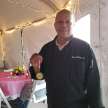
Shoemaker’s Notebook
WL1994
Nearing the main house, young Arthur could see the bustle of activity going on all around. Immediately his insides churned as they had so many times in the past. His papa, Big Jim, was packing to leave. For a moment, he froze, then his mind raced ahead to the security he knew lay in the vast woods just beyond the rear of the horse barn. Somehow in his mind he was already there. Quickly he moved to hide and wait behind the large barn. Finally the last light of day disappeared from the sky. He could hear sounds of animals beginning to move around in the soon to be night woods.
Arthur’s papa bought, sold, and traded horses among other things. His work required him to travel, often on short notice. Most days, Arthur worked as a house boy and cooks helper in and around the big house, the heart of the huge plantation. He also tended the horses, his favorite chore.
Whenever his papa left for long periods, it became a problem. You see, Big Jim’s wife was not Arthur’s mother. Arthur’s mother lived in the slave quarters with his half- brother Ishum. In his father’s absence, Arthur quickly learned he was subject to mistreatment from his papa’s wife. He was not her child and she resented having a sandy haired, blue eyed Mulatto boy resembling her children running around the place. She never physically abused him to the point of leaving marks on his body. However, she had her ways.
She was creative. On occasion, she required him to go stand in the hot field, arms up and out like a scarecrow for hours. Young Arthur’s solution to the problem was simple. Whenever he saw his papa preparing to leave for an extended period, Arthur ran and hid in the woods. There he would roam, explore and wait for a bit of food and water placed in spots by others. He became knowledgeable regarding directions, names of plantations and small towns. Why, even up at the big house when someone stopped for directions most often than not they sent for Arthur. Even ole Missus, head of the house, she’d say, “somehow that li’l rascal knows every place for miles around.”
Arthur’s time spent in the woods enabled him to assist many who ran. Mostly they'd lost direction on the rail that had no tracks and he would point out the North Star and help them on their way.
Arthur recalls meeting an ole boy there who always seemed to lift his spirit. His name was Neddie, or Ned as most everyone called him. Arthur would say, “I used to spot him off an’ on as I hid in the woods. See him comin’ up the road just big as ya please, most always in a good mood, whistlin’ or singin’. He talked real loud and always seemed excited. He joked a lot , always funnin’ you about somethin’ or other. That or he was tryin’ ta trick ya or get somethin’ from ya.”
Ned came from quite a distance up the road somewheres. Seems they allowed him to roam quite a bit. Leastways, he had papers that said so. He was always flashing them, showing off that he could read them and all. Arthur suspected they allowed him freedom to move around because of his trade. Ned was often hired out by his owner to a local leather worker. He actually served as an apprentice learning the trade.
Ned and his business stood out a bit only because of one thing. The smell. Leather workers tore the skin off carrion, dead animals and such in order to get raw material. As Arthur understood it, the process required curing the hides in vats of urine. Mostly from horses. Boy! He always smelled. It seemed never to completely wash off. People down wind a Ole Ned always knew he was a comin’.
Ned tanned many animal hides over the years. For his efforts and money brought to his owner he was allowed to create his own small list of clients. These clients kept him busy with one item. “Negro Shoes”. This cheap footwear was distributed once or twice a year on plantations around the area. Large orders kept the local leather worker so busy he didn’t pay no mind to the little bit Ole Ned did on the side.
Early on Arthur noticed when Ned got to talking about the shoes he was making or ones he left at nearby plantations, he’d pull out this little black book. He kept track of his deliveries and money in it. Arthur noticed it the first time Ned pulled it out because his papa's bible was black just like it, only bigger. They both had the same real nice soft looking cover on them. His papa’s bible was how he’d learned to read.
Big Jim always told Arthur a better day was coming. Now, it was against the law for slaves to learn reading and writing but he'd taught Arthur - - and some numbers too. Sometimes when Arthur would mess up or need admonishing, his papa, smiling, would warn him. Emphasizing he’d say, “and you can write that down in your little black book.” The first time he’d said it Arthur didn’t understand. Heck, he didn’t have no little black book. But before long, after it happened several times, he understood. And you know what? In his mind then he “sho nuff” did have a little black book.
Ole Ned, he would say, “I kill ‘em, skin ‘em ‘an spread ‘em. These is real good shoes I make.” Ned’s pride in his work required a long time to make good shoes. No! Regular slaves didn’t hardly get none a them shoes. Arthur was fourteen or so before he even saw any of them. Ned’s regular job was that of a horse tender or hostler. But, he was given a pretty fair rein. So, even as folks were making fun of him, he was earning his master nice amounts of money. He did so by providing lots of people with the good shoes. Mostly he made his hidden money by making old heavy cowhide slave shoes. They came in big, medium and little. There wasn’t no right or left. They were sorta club shaped so’s you could wear ‘em on either foot. Tell ya something else too. Some a them slave owners -- had one close to Arthur's home--would take them shoes off they slaves in summer and put ‘em in storage. Be cold weather before they got ‘em out again. “Now ain’t that sumpthin?”
Ole Ned was sure a sight comin’ down the road. But, he was on a mission nobody knew about. He’d say, “They never taught us to read or write but they learned us to count this a-way... An ought is an ought an’ a figger is a figger, all for the white man an’ none for the nigger.” Most everyone treated Ned as a clown. He went almost unnoticed and despised ‘cause a his work and smell. What a surprise it was for Arthur to find out about Ned! Ned carried on around there like a darned fool, while all the time he’d been using the money he kept track of in his little black book to help people escape north on the railroad that had no tracks! Arthur found out and knew this because eventually some of those people came to him for directions.
Well, on this night as Arthur hung out in the woods, avoiding ole missus, he confronted Ned. Told him what he knew and quickly admitted his own part in helping many who ran. Suddenly their excitement was shared and before long Ned pulled out his little black book. Arthur told him of his papa’s bible and shared his story. Ned laughed. As he did, he dropped the book. Arthur reached to pick it up and was surprised to see it open to a page with a handwritten map. Wide eyed he asked what it was. Ned went quiet for a moment. Arthur asked what was wrong. Ashamed, Ned admitted that he could only read a little bit and did the best he could with numbers. Arthur asked if he could look at the little black book. Ned said, “Why yes, of course.” After a few minutes Arthur could not help himself. “Where did you get this?” he inquired.
“Well,” Ned explained, “Some time ago, I was over the next road there about to help some people who was fixin’ to run. Before I could help ‘em, pattyrollers got ‘em. Beat hell out of ‘em an’ hauled ‘em off. I found that there little black book in the bushes an’ I been usin’ it ever since. Why you so interested?”
Excited now, Arthur explained that the black book had numbers in it. Large numbers an’ notes that went with the map. Chickamauga! It was a ways from there but he thought he knew where. The notes were talking about how much money every day or so an’ about soldiers from the war to end slavery. Some wearing gray and some wearing blue. Told ‘bout he, the man written’ the notes, was most sick a being made ta buryin’ 'em. But it say sumpthing about going through they pockets and what he found before he put ‘em in the ground -- including a courier’s satchel. “This map!” exclaimed Arthur. “Ned, theys a big ole rock. A boulder. Got a hole under it. Ned! We got ta go!”
They set off very early the next morning both well aware that it was a long way. The map had it near one a them famous battlefields from the war to end slavery. Only wasn't nobody free yet. Two or three times it became necessary to hide from pattyrollers and once they were frightened near to death and forced to run from a huge snake. Finally, they come to the area on the map. A big open place. Lookin’ around they both felt ill. They’d come so far but it looked impossible. They had to try. In a wooded area just off the fighting field they started looking.
As evening grew near, clouds overhead pulsed with strips of lightning. They both knew there wasn’t much time left. They simply could not spend the night. Arthur was just about to give up when a bright bolt of lightning flashed on the biggest rock he’d seen in the area. “There!” he yelled. “Over there!” They ran to the stone. Together they swiveled it around and sure enough there was a dark hole there. Arthur thought about the snake earlier in the day. Still, he reached in anyway and came up with a large canvas knapsack. It was loaded.
They dropped to the ground. Once again Arthur reached in. This time he pulled out a large handful of paper money. “Oh heavens!” They both exclaimed. It’s southern confederate money -- worthless. “Oh my,'' said Arthur. Ned was beside himself. “Hell, I‘ma burn it. I’ma burn it all.” He reached and grabbed the bag. Hearing coins, he dumped it out. More confederate money fell out -- then came a rush of Yankee paper greenbacks a tumbling out.
Arthur, knowing how to count most to one hundred at least, began to put them in stacks, some with a one on them, others a five and such. He counted to twenty, time and again. Then he spotted several large tied Yankee bundles likely from the satchel. A torn receipt attached... it say... Payroll... it show a 20... and least three oughts following. Ole Ned, he was making a fire with the gray money. They couldn’t leave with that sack ‘til after dark set in. So, they agreed to spend the time planning. Yes! Planning just how their newly funded station of the rail without tracks was gonna run.
About the Creator
Eudell Watts
Former business owner, college basketball coach/student counselor. Currently, award winning chef, story teller and children's book writer.






Comments
There are no comments for this story
Be the first to respond and start the conversation.